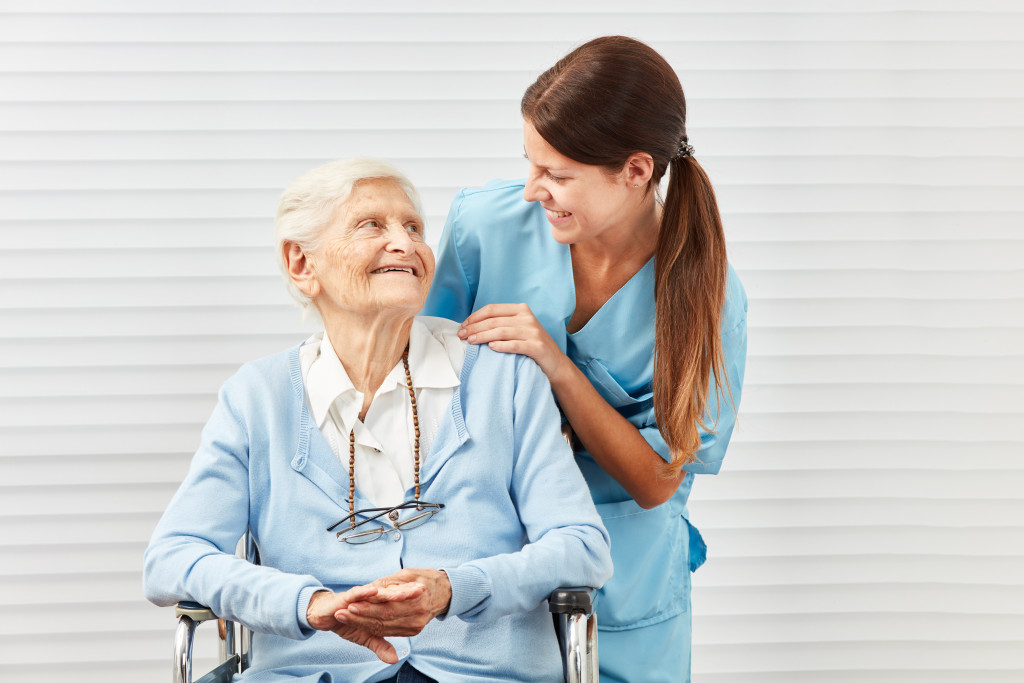- Ensure medical attention for seniors through professional home care, monitoring of medical conditions, and regular check-ups.
- Create a tailored diet plan to give seniors the energy and nutrients they need for daily activities.
- Learn about medications and treatments for common aging issues such as dementia or arthritis.
- Encourage socialization with family, friends, and others to build solid relationships and prevent isolation.
People’s physical and mental health needs can become more complex as they age. Caring for seniors requires patience, understanding, and knowledge of how to meet the unique needs of aging adults.
It is essential for family members as well as caregivers to be aware of the best ways to provide care that takes into account all aspects of an older adult’s health and well-being. This article will discuss some tips on providing quality care for seniors to ensure they stay safe and healthy while aging with dignity.
Ensure medical attention
Here are some tips to ensure medical attention for seniors:
Consider professional home care
Professional home care can be an ideal solution when considering the care of aging seniors. Home care ensures that elderly individuals can remain in their homes, reducing feelings of isolation which can become increasingly familiar with age. Professional caregivers additionally provide the peace of mind that the individual receives tailored, quality care from a trained and experienced healthcare provider.
Not only does this relieve family members who may not have all the skills to provide for their loved one’s every need, but it also eliminates any stress or burden on the senior who may otherwise try to take on all responsibilities themselves and often feel overwhelmed. Home care allows families to manage various needs while continuing to keep up daily routines.
Monitor their medical conditions closely.
Monitoring seniors’ medical conditions closely are essential to caring for them as they become increasingly vulnerable. This includes tracking their vital signs regularly, such as pulse, temperature, and respiration, attending regular check-ups, and keeping records of test results.
Doing this allows healthcare professionals to detect any concerning issues at the earliest possible stage and intervene quickly, thus reducing the potential negative impacts of undiagnosed or untreated medical problems.
It is also essential for those looking after seniors to be aware of signs and symptoms that may indicate changes in someone’s health, such as reduced mobility or diet, loss of bladder control, or severe changes in sleep patterns.
Follow a healthy diet plan

A healthy diet plan tailored to one’s particular needs is essential for elderly individuals to age gracefully, maintain their energy levels, and stay vibrant.
Proper nutrition gives them the energy needed for daily activities, boosts their immune system to fight off illnesses better, helps them to prevent or manage chronic diseases like diabetes & hypertension, and even gives them a clearer sense of well-being.
Seniors need access to healthy food choices as traditional meals become more challenging with age, making it difficult to acquire the right balance of vitamins and minerals.
Learn about medications and treatments.

Learning about medications and treatments for common aging issues like dementia or arthritis in caring for seniors. There are countless treatments and drugs on the market that are marketed toward seniors with varying degrees of side effects, cost, and effectiveness.
Knowing where to start when trying to sift through this information can be challenging. Still, properly understanding available medication options will help ensure that the senior receives the most effective treatment possible while minimizing potential side effects.
Additionally, having the correct information on treatments and their costs will allow caregivers to appropriately budget time and resources and maintain open lines of communication with healthcare professionals concerning them.
Encourage socialization with family and friends.
Research has made clear that socialization is essential for senior health and well-being. Crucial socialization includes developing productive relationships, building self-esteem and a sense of belonging, and preventing isolation which can lead to depression and other detrimental effects.
Encouraging social interaction with family members, neighbors, new acquaintances, old friends, or even pet companions are effective ways to support seniors in their physical and mental health pursuits. Quality time spent in the company of those important to them can strengthen personal relationships and create meaningful memories, which will help to preserve their overall sense of purpose and self-worth.
It is vitally important to maintain communication among those geographically close and those who live far away since this helps build connections without the barriers associated with distance.
Make sure safety measures are taken.
Making sure safety precautions are taken to prevent falls or other accidents is one of the most important aspects of caring for seniors. Falls can have an enormous negative impact on a senior’s physical health and overall sense of security and independence. Furthermore, falls can increase healthcare costs, such as doctor visits and extended hospital stays.
This is why it is essential for loved ones and professional caregivers to understand how and why falls occur to prevent them. Items like floor rugs should be removed if they pose a tripping hazard; handrails should be installed in bathrooms, bedrooms, or outdoors on walking paths; medications should be reviewed for possible side effects that could cause dizziness, and ensure that there is enough lighting in dark rooms during nighttime hours to avoid any missteps.
These are just some of the best ways to care for seniors and ensure they are safe, healthy, and able to age with dignity. With the right approach and knowledge, family members and caregivers can work together to ensure their elderly loved ones receive the highest quality of care they need and deserve.




